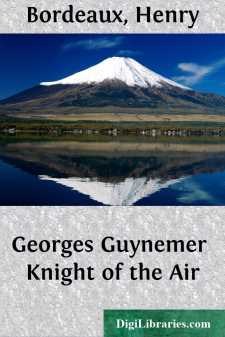History
- Africa 30
- Americas (North Central South West Indies) 50
- Ancient 68
- Asia 58
- Australia & New Zealand 8
- Canada 41
- Caribbean & West Indies 1
- Civilization 20
- Eastern Europe 12
- Europe 310
- Expeditions & Discoveries 60
- General 77
- Historical Geography 1
- Jewish 9
- Latin America 3
- Medieval 8
- Middle East 13
- Military
- Revolutionary 8
- Study & Teaching 5
- United States 353
- Western Europe 56
- World 13
Military Books
Sort by:
INTRODUCTORY The close of the fifteenth century had left the whole structure of mediæval Europe to all appearance intact. Statesmen and writers like Philip de Commines had apparently as little suspicion that the state of things they saw around them, in which they had grown up and of which they were representatives, was ever destined to pass away, as others in their turn have since had. Society was...
more...
by:
Henry Bordeaux
CANTO I CHILDHOOD I. THE GUYNEMERS In his book on Chivalry, the good Léon Gautier, beginning with the knight in his cradle and wishing to surround him immediately with a supernatural atmosphere, interprets in his own fashion the sleeping baby smiling at the angels. "According to a curious legend, the origin of which has not as yet been clearly discovered," he explains, "the child during...
more...
CHAPTER I The Independent Regular Brigade Place of meetingвÐâForces comprised by the commandвÐâWhy we were not like the VolunteersвÐâCharacteristics of the professional soldierвÐâSketches of the more important officersвÐâWhat we were ordered to do. Yauco, the place selected by General Miles as a rendezvous for the troops of the Independent Regular...
more...
by:
R. W. Allen
Chapter I INTRODUCTION: THE EMPIRE AND ITS DEFENDERS The war in South Africa has been fruitful of A many results which will leave their mark upon the national life and character, and in which we may wholly rejoice. Amongst them none are more admirable than the awakening to the duty we owe to our soldiers and sailors, and the large-hearted generosity with which the whole empire is endeavouring to...
more...
FOREWORDBy the Editor of "The Bystander."HEN Tommy went out to the great war, he went smiling, and singing the latest ditty of the halls. The enemy scowled. War, said his professors of kultur and his hymnsters of hate, could never be waged in the Tipperary spirit, and the nation that sent to the front soldiers who sang and laughed must be the very decadent England they had all along denounced...
more...
by:
Katharine Blunt
CHAPTER I Wheat is as much a war necessity as ammunition—wheat is a war weapon. To produce it and distribute it where it is needed and in sufficient quantities is the most serious food problem of the Allied world. The continent of Europe, with her devastated fields, can raise but a small fraction of the wheat she needs, and ships are so few that she cannot import it from many of the usual sources....
more...
CHAPTER I VERDUN Beneath the canvas of a huge hangar mechanicians are at work on the motor of an airplane. Outside, on the borders of an aviation field, others loiter awaiting their aërial charge's return from the sky. Near the hangar stands a hut-shaped tent. In front of it several short-winged biplanes are lined up; inside it three or four young men are lolling in wicker chairs. They wear the...
more...
INTRODUCTORY The following extract from the Espejo de Navegantes, or Seamen's Glass, of Alonso de Chaves serves to show the development which naval tactics had reached at the dawn of the sailing epoch. The treatise was apparently never published. It was discovered by Captain Fernandez Duro, the well-known historian of the Spanish navy, amongst the manuscripts in the library of the Academy of...
more...
The bombardment of Antwerp began about ten o'clock on the evening of Wednesday, October 7. The first shell to fall within the city struck a house in the Berchem district, killing a fourteen-year-old boy and wounding his mother and little sister. The second decapitated a street-sweeper as he was running for shelter. Throughout the night the rain of death continued without cessation, the shells...
more...
I Had you been in Paris late in the afternoon of Monday, August third, nineteen fourteen, you might have seen a slight man, whose reddish face was adorned with a thick white mustache, walk out of the German Embassy, which was situated on the Rue de Lille near the Boulevard St. Germain. Along the boulevard and across the Pont de la Concorde he walked in a manner calculated to attract attention. He...
more...











